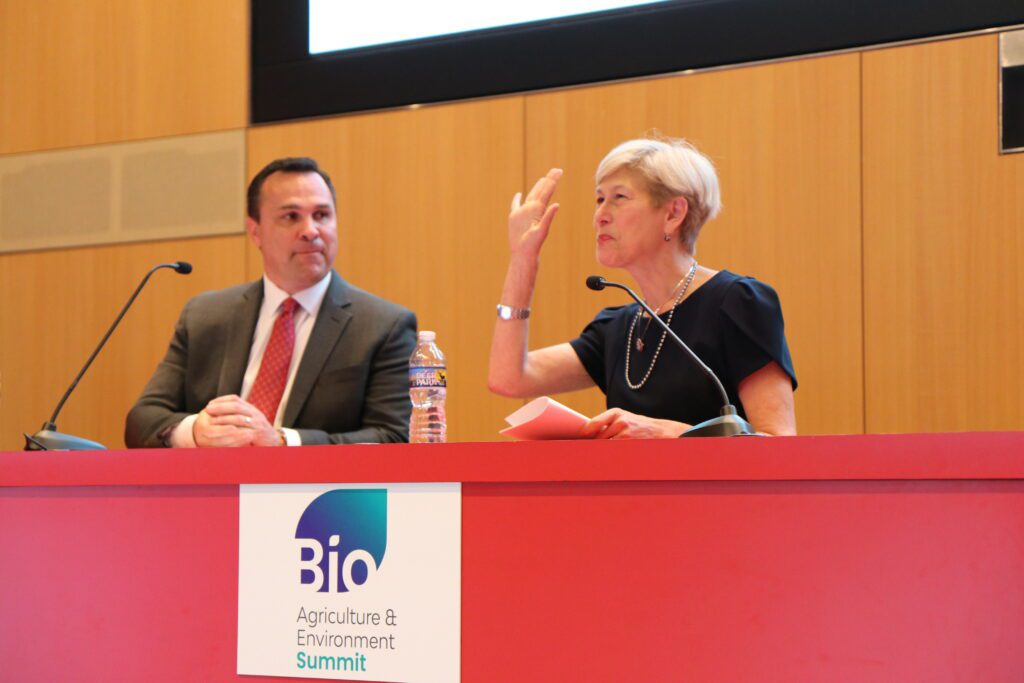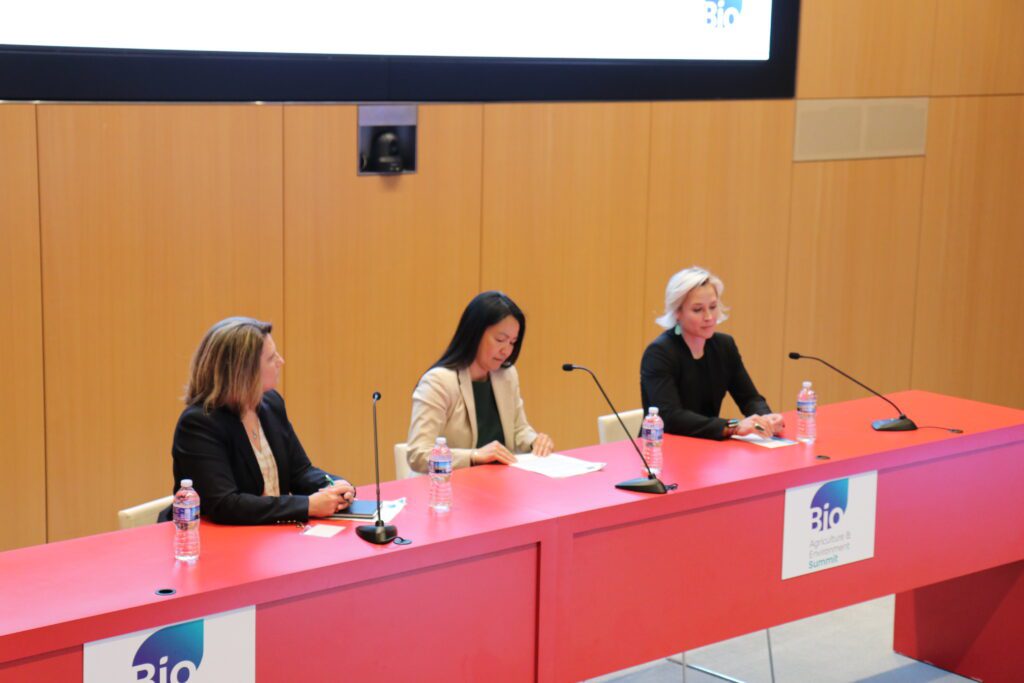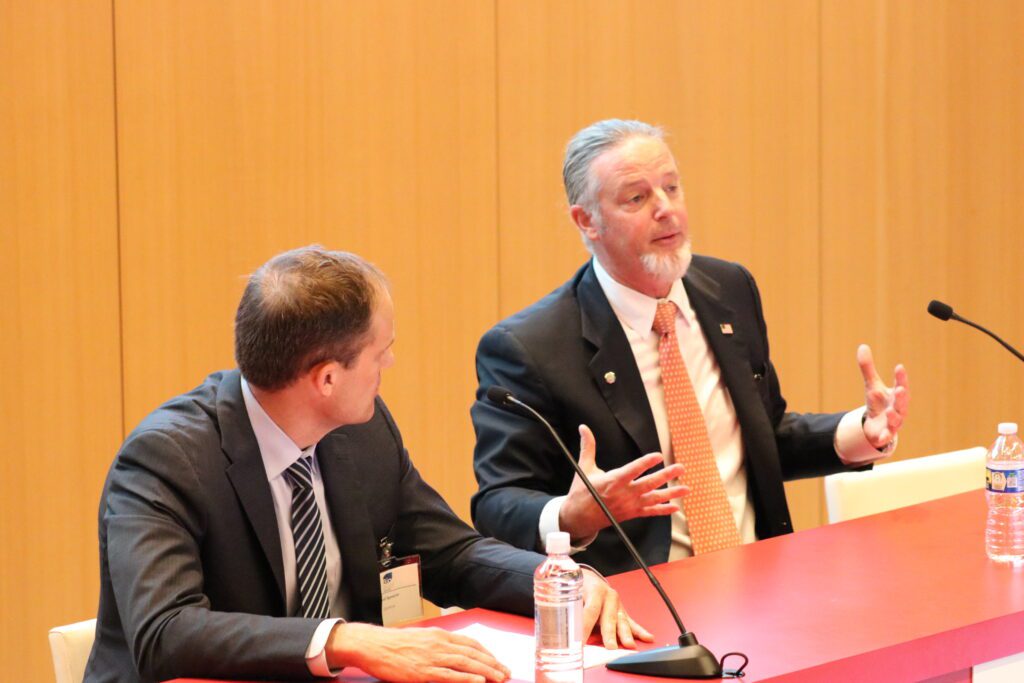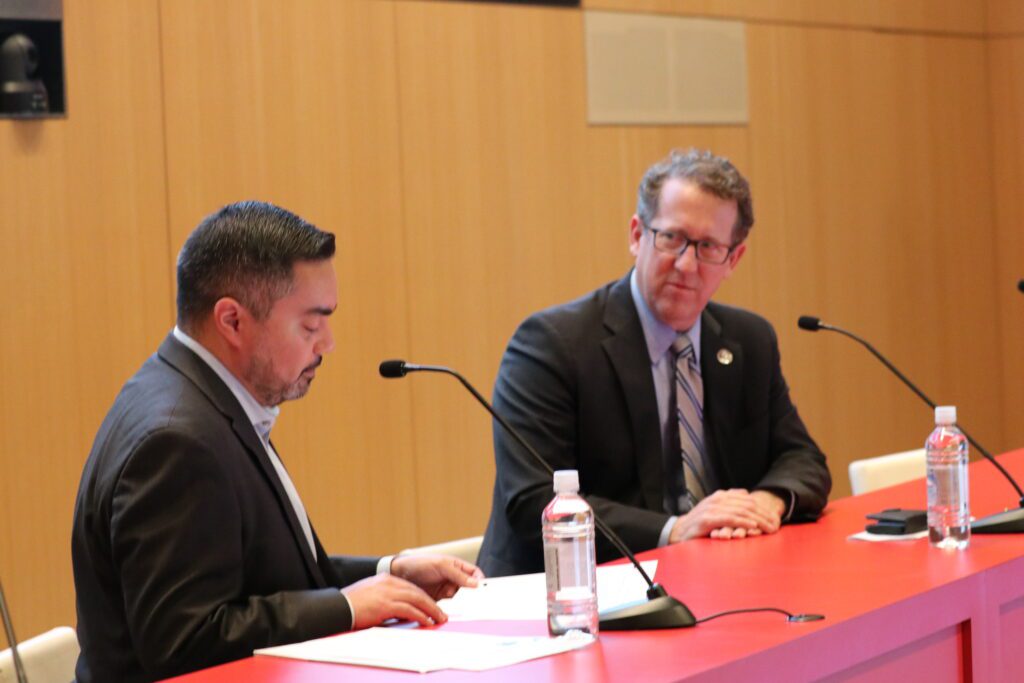On April 18, BIO’s inaugural Agriculture & Environment Summit brought together bipartisan policymakers who emphasized the promise of innovation to address key challenges such as climate change.
Throughout the day, speakers underscored the necessity of “rules-based trade” to foster American biotech innovation and leadership, stressing the importance of intellectual property protection and science-based trade policies and agreements.
Here are a few highlights from the policymakers and regulators who spoke at the event.
Rep. Deborah Ross (D-NC): ‘Investment and innovation in these technologies is essential’

The day began with Rep. Deborah Ross (D-NC), Ranking Member of the Space, Science, & Technology Subcommittee on the Environment, whose district includes North Carolina State University and much of the Research Triangle Park.
“North Carolina is home to over 70,000 [biotechnology] industry jobs and over 800 companies,” she said.
“In North Carolina, our communities and farmers are too familiar with the devastating impacts of climate change,” she continued. “Agriculture and environmental biotechnology can help us produce climate-resistant crops that are better able to survive extreme weather and help our food security. Investment and innovation in these technologies is essential.”
“We need to make sure that we thwart climate change. Some of it is inevitable, but much of it is manmade. And agriculture contributes to climate change; it’s not just cars and power plants. Cows, bio-gases, and all sorts of things contribute to climate change. What you all can do is help find alternatives to the ways we used to do things”—like biofuels.
Intellectual property protection is key, she said, noting that companies should be able to use that property to get a return on investments in R&D. At some point, property rights may end, but if there is not a period of time when the original inventor can recoup R&D, we will not have the innovation that we are so proud of in this country.
The regulator viewpoint
A morning session brought together key regulators:
- Madison Le, Director of the Biopesticides & Pollution Prevention Division at the Environmental Protection Agency (EPA);
- Bernadette Juarez, Deputy Administrator for Biotechnology at the Department of Agriculture (USDA); and,
- Dr. Kristi Muldoon Jacobs, Acting Director of the Office of Food Additive Safety at the Food and Drug Administration.
They focused on their coordinated efforts and regulatory priorities to address climate challenges and the need to feed a growing population.
Biotechnology regulators are working together to keep pace with scientific innovations in agricultural and environmental biotechnology and emphasize the importance of stakeholders engaging with regulatory agencies early and often.

Ambassador Doug McKalip: ‘American agriculture out-innovates everybody in the world’
To kickstart the afternoon, Doug McKalip, Chief Agricultural Negotiator at the Office of the U.S. Trade Representative (USTR) noted good news: three years in a row of record agriculture exports, and over $21 billion worth of new agricultural market access.
Now, in the push for sustainability and addressing climate change, we need to ensure that trade is not cut off: “We need to make sure trade incentivizes stewardship and incentivizes climate adaptation,” he said.

Innovations from BIO members will “drive solutions going forward,” such as pest resistance and drought tolerance. USTR is aggressively pursuing regulatory language to make sure we don’t disincentivize this technology.
“At the end of the day, it’s all about the farmer,” he said. In order to invest in climate-smart stewardship and technology, the farmer needs to know they can get these products to market.
As new traits come into the supply chain, in every marketplace, USTR is discussing the U.S. approach to plant biotech, explained McKalip. The U.S. works to get trading partners to a point where technologies that look like traditional plant breeding are not overregulated, which not only hinders market access but also puts a burden on government agencies. The goal is “making sure risk assessments are based on science.”
This is especially true in Mexico, where genetically modified corn faces a looming ban—and it’s important for different agricultural commodity sectors and government agencies to band together. Because if they ban biotech corn, they may “play loose with the science” on other crops, he noted. As the first Sanitary and Phytosanitary (SPS) case ever brought forward under the U.S.-Mexico-Canada Agreement (USMCA), McKalip said, the Biden administration took the time needed to ensure proper consultation procedures and position the U.S. for success.
“I feel very confident about the case with Mexico,” he said. The decision is expected later this year, and the election in Mexico provides an opportunity to have “a new approach.”
The bottom line is that the Biden administration is “leaning in” to the bioeconomy, which is driving jobs in rural economies, and providing a marketplace for new and beginning farmers to be successful, concluded McKalip. Notably, aviation fuel and other biofuels present “unbelievable opportunities in just sheer volume in dollars.”
“Our products will outcompete anybody on consistency and quality,” he said. “American agriculture out-innovates everybody in the world.”
Rep. Adrian Smith (R-NE): ‘Rules-based trade is the best way to level the playing field’

“Rules-based trade is absolutely key,” said Rep. Adrian Smith (R-NE) and it’s important to uphold it. Earlier this week, the House Ways & Means Committee marked up the Generalized System of Preferences (GSP) legislation, including a provision that enables USTR to put a country’s GSP status at risk if agricultural products are not being handled properly.
American agriculture “can help feed the world,” he said. “We lead the world—let’s not cede that spot.”
Trade policies should be tailored to support rural economies, he said. Nebraska produces more food than it consumes, and America, with its resources, ingenuity, and innovation, is in a position to help feed the world.
Moderator John Torres of BIO asked how trade can help bring climate-smart tech to grow rural economies and make agriculture more sustainable. Climate-smart technology enables us to be more efficient with resources, including natural resources. We need to investigate how we can be more efficient and ultimately be stewards of our natural resources, said Rep. Smith.
Rep. Smith noted the bipartisan achievement of USMCA—a Trump administration priority, under Speaker Nancy Pelosi. We can use those dynamics to draft and modernize other trade agreements. Successful trade agreements need market access and enforcement, he said.
“Rules-based trade is the best way to level the playing field,” he said, referencing the biotech corn dispute resolution underway with Mexico under the USMCA. We can’t be perceived as giving Mexico a “pass,” he said, because that will be “problematic to all rules-based trade.”
Rep. Smith touched on the link to national security and biosecurity and the need to ensure trade policies adequately protect food production or human health. “We’ve got a growing population,” he said, and it’s “in our interest, economic interest, to lead the way on innovation.”
“The number-one reason we need a more vigorous trade agenda is because of China,” he concluded. Moving GSP out of the committee yesterday is a step in the right direction.
“Let’s never take for granted what the marketplace delivers here in America,” he concluded, with a reference to proposals to waive intellectual property protections under the Trade-Related Aspects of IP Rights (TRIPS) agreement. America’s treatment of private property—real property or intellectual property—sets us apart. We shouldn’t give it away, because “we can do more for the world if we leverage private property rights.”
USDA’s Alexis Taylor: ‘We have a great story to tell’
Alexis Taylor, Under Secretary for Trade and Agricultural Affairs at the U.S. Department of Agriculture (USDA), provided an overview of agricultural trade in America.
U.S. ag exports are a critical driver of the food and agriculture sector in the U.S., and 20% of all U.S. production is exported. This can make the difference when it comes to making a profit or not in a given year. Meanwhile, when a country increases its middle class, these people typically want higher-quality, more diverse food products—which the U.S. excels at producing.
She highlighted four priorities right now with agricultural trade:
- We need to ensure the U.S. is enforcing existing trade agreements. The USMCA case that the U.S. has brought against Mexico re: GM corn is a key example, but there are others.
- The administration is working to eliminate technical barriers to trade—for example, last year, it achieved 10 tariff reductions in India for a variety of products. As a result, we’ve seen increasing agricultural exports to those markets.
- International standards and policies must be transparent and science-based. (A common theme.)
- Market diversification is key. The U.S. has long been a leader in food and agriculture exports, but 60% have gone to four markets (China, Canada, Mexico, EU). The government’s Regional Ag Promotion Program (RAPP) invests $1.2 billion with industry to invest in new growing markets (Africa, South America, SE Asia).
She highlighted several buzzy trade topics, from Europe’s approach to gene editing—which she called “much more forward-leaning, innovation-focused” than in the past—to the need for market diversification, especially when it comes to China.
In every meeting she has, partners are “fully leaning into climate change,” she added. Trading partners want to know about climate-smart technology and want to learn from the U.S. No one is more innovative or efficient than the U.S.—and no one is going to be more climate resilient.
“We have a great story to tell. We are continuing to invest in the space,” she said. “We have a real opportunity,” especially with growing consumer interest in sustainable products. “The U.S. has an opportunity to drive what that means and create new market opportunities, and hopefully, new revenue streams for our agricultural community as a leader in this space.”



